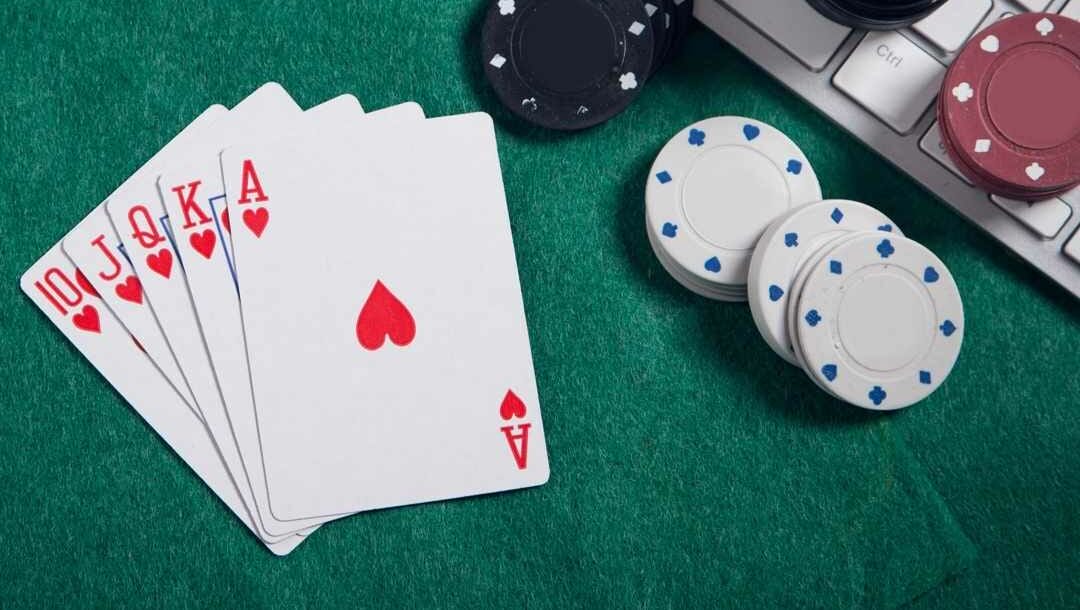In order to play poker, you only need to understand the basic rules of the game. However, if you want to reap all the benefits of this casino game, you’re going to need to understand the odds and the various mathematical calculations you can make. Once you understand things such as pot odds and implied odds, you can make better decisions on any given hand, allowing you to play more profitably.
Whether it’s a casual game or a live poker tournament, when playing online poker, you’ll probably have noticed that draws (where you have four cards towards a straight or flush) are quite common. In order to play draws profitably, you must first understand the following odds:
- Percentages of your hand improving
- Pot odds
- Implied odds
Let’s take a look at what poker odds, pot odds and implied odds are, regardless of whether you’re playing Texas Hold’em, Seven Card Stud or any other versions of poker, and how you can apply pot odds to help you win.
What Are Poker Odds?
Poker odds simply refer to the probability or likelihood that you can expect to win or lose a round of poker. When you’re playing poker online, understanding the odds can help you decide when you have the best hand to call or raise a bet. If you want to create a profitable plan, you’ll need to know the odds to assess the current situation. It can take some practice to get the hang of it, but once you’ve conquered the odds, you’ll be able to play poker more confidently.
Know the Basics of “Outs” in Poker
An “out” is any card that comes on a later street and which will help you improve the strength of your hand. If you know the number of outs a player has, it will strengthen your poker strategy tremendously.
How To Use Outs To Calculate Your Odds
In order to calculate your poker odds, you’ll need to know your outs. For example, if you are on a flush draw for hearts, there remain nine hearts (outs) in the deck that will give you a flush. This is because there are 13 cards per suit in a deck.
This value will change depending on what you need in order to win with any particular hand. Some hands may even give you multiple opportunities to win, thereby increasing your potential outs. For example, you may have a potential flush and a pair, which increases the number of outs you can take advantage of.
You can easily calculate the odds you’d have of improving your hand on either the turn or the river. After the flop, there are 47 unknown cards in the deck. You can divide the number of outs you have by the total number of unknown cards in the deck to give you the chance to improve your hand with the final card.
What Are Pot Odds?
Pot odds are the ratio of the current size of the pot to the cost of a contemplated call. This comes in handy when you’re on a flush or straight draw. Knowing how to work out the pot odds basics will let you know whether to call or fold, depending on the size of the bet.
The perfect position to be in is to have great pot odds. In other words, you’ll only have to bet a small amount in order to potentially win a big pot. For example, if there’s a pot of $100 and another player places a bet of $50, you would need to call to stay in the game. The pot odds for this particular hand is $100:$50, or 2:1.
This can be expressed as a percentage, which you get by combining the pot and call values. In this case, the total is $150. You then divide the call value by the total in order to get your pot odds as a percentage. In this example, the pot odds percentage is $50 divided by $150, which is 0.33, or 33.33%. Here’s how to use percentages instead of odds if you prefer.
What Are Implied Odds?

Implied odds take into account the money you could potentially win on future streets if your draw hits. Implied odds will show how much extra money you need to make on the next street. This is a good way to justify whether you should continue with a hand to improve your chances of a winning hand on the next card.
You’ll need to calculate your pot odds when facing bets and raises. Good implied odds means you believe you can win more money from your opponent after you hit your draw. However, if you predict you won’t be able to get any more money from your opponent on future streets, you have little or rather no implied odds.
Calculating Implied Odds
While there are various implied odds calculators out there, you can use logic to calculate the minimum amount you require to win on future streets, which is ideal in a high-paced game or tournament. This way, you can justify an unprofitable or profitable call. Calculating your implied odds is simple: you subtract your pot odds from the odds of hitting your draw. This will give you a new ratio, which can be compared to the amount you have to call so that you can work out how much money you need to take from your opponent later to make the call profitable.
For this, you’ll need to know three variables, including your hand’s equity versus your opponent’s betting range, the size of the pot after your opponent raises or bets and how much you have in order to call at the current moment.
By using the implied odds calculation, you can calculate additional factors that will enhance your mathematical and decision-making abilities.
- You can work out if it is profitable to call if your opponent is only going to call a future bet a certain percentage of the time.
- You can calculate the exact amount of money you’d have to win on a future street in order to make your current call profitable.
When playing real poker, you are likely to encounter complex situations. Most times, it can be hard for a player to process and calculate pot odds efficiently. However, a basic understanding of poker odds is imperative when playing both online poker and live games. When you’re playing poker online for real money, always remember to count your outs and check in to see how your pot odds compare to your winning odds. Over time, it will become second nature and help you win more often.
What’s the Difference Between Pot Odds and Implied Odds?
In pot odds, there are a number of simple mathematical rules and formulas that you can use to determine exactly what your odds are. However, this doesn’t really apply to implied odds. Instead, you simply have to work out how much you need to make from the rest of the hand in order to understand whether calling is going to be profitable.
In implied odds, you use your opponent and the situation to make an estimate, which obviously becomes easier when you get more exercise playing poker. The more you play, the faster you will be able to estimate the implied odds of your hand.
Play the Best Online Poker at BetMGM

Test out your implied odds examples and calculations at BetMGM when you play poker online. BetMGM offers exciting online poker tournaments and casual real-money games for you to enjoy and try out everything you’ve learned.
With your newly acquired poker odds strategies, other newly gleaned knowledge, such as how to calculate craps odds, and the right amount of experience, you will be on your way to potentially winning big in any game. All you need to do is register with BetMGM and start playing!










